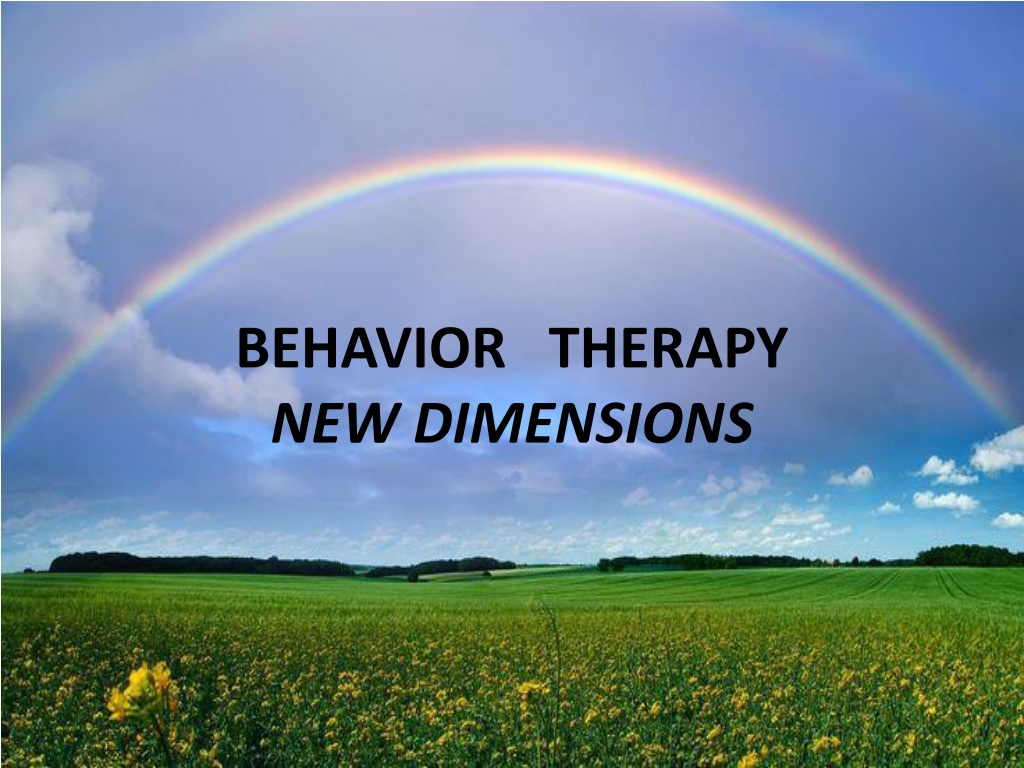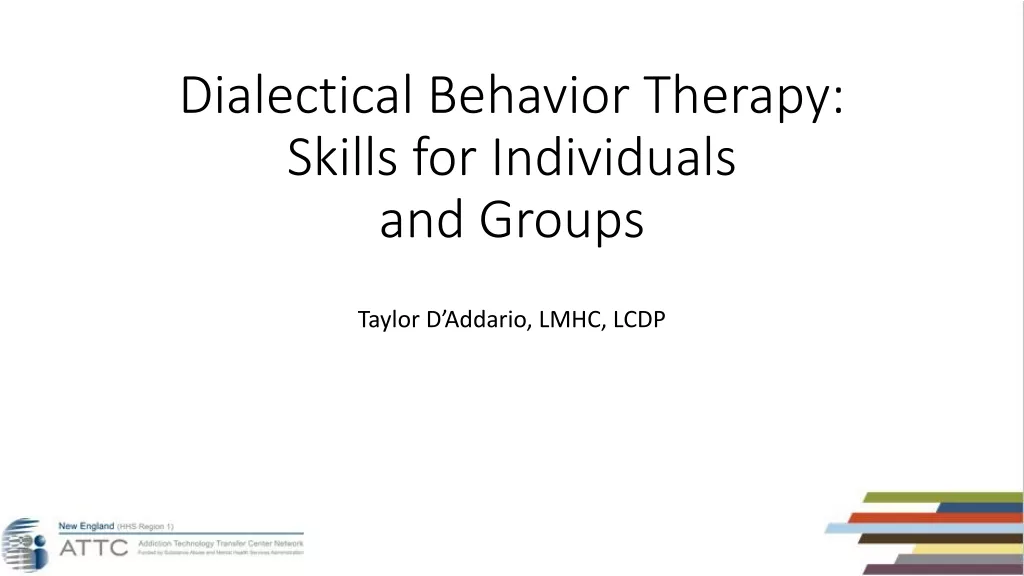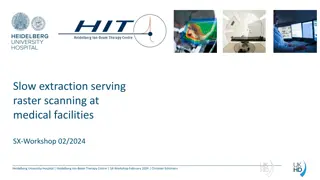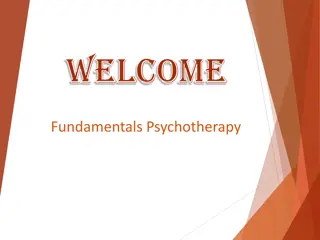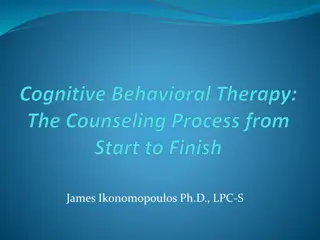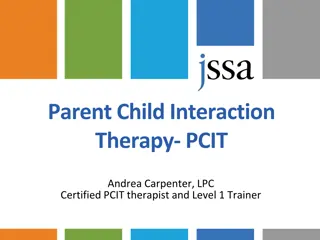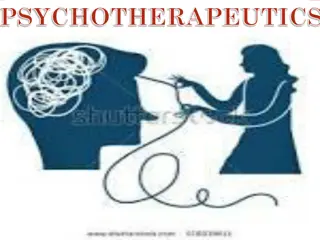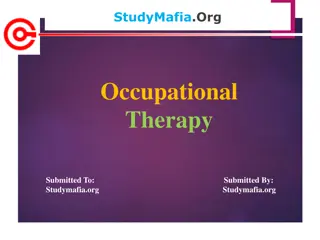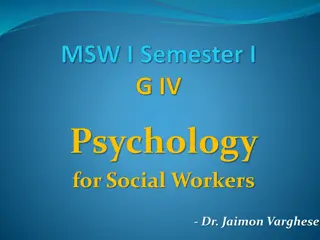Insights into Cognitive Behavior Therapy
Cognitive Behavior Therapy (CBT) is a therapeutic approach that focuses on how individuals interpret events, mediating their emotions and behaviors. This form of therapy aims to help individuals develop realistic and adaptive interpretations, guiding them towards healthier coping mechanisms. CBT is founded on the understanding that individuals create personal environments based on their beliefs, influencing their responses to stressors and cognitive processing. By addressing maladaptive beliefs and behaviors, CBT assists individuals in managing their thoughts, emotions, and behaviors more effectively, promoting positive mental well-being.
Download Presentation

Please find below an Image/Link to download the presentation.
The content on the website is provided AS IS for your information and personal use only. It may not be sold, licensed, or shared on other websites without obtaining consent from the author. Download presentation by click this link. If you encounter any issues during the download, it is possible that the publisher has removed the file from their server.
E N D
Presentation Transcript
BEHAVIOR THERAPY NEW DIMENSIONS
Behavior therapy was defined as the application of theory to the treatment of clinical problems where regarded as a consequences. modern learning behavior function was its of
Gradually it came to be recognized that the influence of environmental behavior is largely determined by cognitive processes which govern what environmental influences are attended to, how they are perceived and how the individual interprets them. events on
AARON BECK ALBERT BANDURA ALBERT ELLIS MARTIN SELIGMAN MARTIN MICHEINBAUM GEORGE KELLY
GOAL OF COGNITIVE BEHAVIOR THERAPY Understand interpretation or judgment of the experience of the individual. Assist him to interpret in a more realistic and adaptive manner. the subjective
BASIC ASSUMPTIONS IN COGNITIVE BEHAVIOR THERAPY The way individuals interpret events and situations mediate how they subsequently feel and behave.
The interpretation of events is active and ongoing. Individual establishes a personal environment and accordingly respond to events.
Individuals develop idiosyncratic belief systems that guide behavior, influencing an individual s perception and memories and leading to memories being activated by specific stimuli or events called stressors .
These stressors consequently contribute to a functional impairment of an individual s cognitive processing maladaptive overlearned coping responses. and activate
The cognitive specificity hypothesis states that clinical syndromes and emotional states can be distinguished by the specific content of the belief system and the cognitive process that are activated.
CASE STUDY Case A Ph.D scholar in IIT, Kharagpur Symptoms: Anxiety especially before exams. Palpitations, shivering of hands, lack of appetite, headache, lips twitch. Crying spells, afraid to go out, feels she will die, seeks reassurance. Is in a dilemma: whether to continue research or to take a job and buy a 1bhk flat which will give her some self worth. Uncongenial home environment
What are the situations which make you feel so negative? What are your thoughts in those situations? Birthday : I don t deserve. Friend s gift : Not doing from heart. I am not that worth. Boyfriend friendly with another girl : I am not enough. After talking with friends : Maybe I spoke too much. Maybe I overshared.
Self Idea: I am not that worth. Idea of others: Others do not like me.
You feel others do not like you. Did you hear negative remarks from others? How early you can think of? She narrated interesting news: no one believed Told about earthquake: no one believed In madhyamik got 92%: sarcasm Mother can now stand with her head held high She sat behind the 1st. girl in exams, results very good, cheated Teacher s day, suggestion of gift: no one accepted Secret leaked: blame on her Tutor: very disobedient Peer group: Negative remarks Told friends after getting in IIT: Anybody can get. Boyfriend hurtful: I am not good enough Art teacher: If you want to be art director then you have to learn art. Chemistry teacher: You are a good student? IIT Senior: Will you be able to do it?
What thoughts make you so anxious before exams? I will not perform well. If it happens why will it be so upsetting? I will fall behind. Suppose it is true why will that be so upsetting? Others will think I am no good. Suppose they think like that what would be so upsetting for you? Then I am not good.
SCHEMA Self Schema I am no good/of no worth/importance Schema of self in relation to others: Others think less of me. Schema of good and bad: A person is good if others approve of me.
SCHEMA & AUTOMATIC THOUGHTS Schema refers to organized cognitive structures made up of general knowledge about the attributes of a stimulus domain and the relationships among these attributes. Automatic thoughts automatically come into the mind. are thoughts that
SCHEMA - CHARACTERISTICS Give meaning to incoming information. Not in conscious awareness but directs our attention. Incorporate emotions. Maintained through process of assimilation and accomodation. Developed and consolidated over the course of an individual s infancy and childhood. Activated by experiences that are similar to early experiences. Activation spreads through associative links of the schema s network.
COGNITIVE DISTORTIONS LABELING SELECTIVE ABSTRACTION PERSONALIZATION FORTUNE TELLING MIND READING JUMPING TO CONCLUSION
PRESENT STRESSORS Viva: Cannot answer a question. I am no good and I will not be able to perform. Project Leader: we will manage. You can do other things. I am not wanted. Classmate s comment: But she didn t do well in HS. I am still as bad as I was before. I couldn t come up. When her research guide attends to another research scholar. He gets more attention. He is superior.
MALADAPTIVE COPING MECHANISMS USED Others will love me .if If I perform very well in academics. Hard work may not be sustained, will generate lot of anxieties. Stressor: Low result, someone doing better, criticism If I have very close friends. Excess socialization at the cost of other things, a pressure to be good to people, difficulty to say no, fear of rejection Stressor: loss of friendship, criticism If I am given responsibilities. Lot of extra work Stressor: Not given responsibility while others are given.
COGNITIVE RESTRUCTURING Questioning the evidence: Did her M.Sc. 1st. Sem. with severe depression yet performed very well. Though overwhelming at first yet is able to master. Eg. Cycling, literature survey Did M.Sc. from IIT (K) and at present doing Ph.D. She went to collect her luggage alone. Patience Takes up negative comments as challenge Can organize events. Cooks well.
COGNITIVE RESTRUCTURING Rational Responding Challenging dysfunctional thought Identification of thought, emotion and situation which is causing difficulty and then developing a rational response. Questions asked: What is the evidence for and against the specific interpretation? Are the interpretations logical? Is the causal relationship correct? Is a thought confused with a fact? Are interpretations of the situation realistic? Is it black and white thinking? Are you confusing certainties with possibilities? What are the advantages and disadvantages of this type of thinking? What would be a more rational way of looking at that?
Other cognitive techniques used: Decatastrophizing, distraction, labeling of distortion Behavioral techniques used: Activity scheduling, relaxation techniques
NEW SCHEMA I am adequately capable by my own behavior and my own performance. It is nice when people appreciate me. But always people may not validate me. I must be able to evaluate myself and also appreciate myself.
CASE B Male, studying in 1st year of college with Eng. hons. Only child living with parents and grandmother. He sees smashed faces of his parents and grandmother as images. He has to stop what he is doing, imagine another person s face there and in this way reverse the harm that may happen to his close people. He was diagnosed with OCD. Separation anxiety & other fears in childhood. Childish, no ambition, wants to do something small and stay with parents.
SCHEMA Adulthood is fearful. One loses one s parents and becomes alone. Psychologically trying to halt his development. Behaviorally childish for his age. FEAR: Fear of losing close people, fear of being alone. Self Schema: I am less. I lack in capacity It is alright if I do something small. STRESSOR: Criticism, Comparison
INTERVENTIONS Psychoeducation Psychoanalytic Theory of Personality Carter & McGoldrick s 6 stages of Family Life Cycle
CHALLANGING THE FAULTY INTERPRETATION Challenging the overimportance given to thought. Challenging thought can cause action. Challenging the need to control thought. Challenging threat estimation.
EXPOSURE BASED TECHNIQUES Systematic desensitization Flooding QUESTIONING THE EVIDENCE DISTRACTION
MALADAPTIVE SCHEMA People will die and leave you, you are alone and helpless. I lack in capacity. If I do not grow up, I can be with my parents and they will not have much demands or expectations from me.
REALISTIC SCHEMA My parents are well. We enjoy each other s company. If anyone gets sick, Doctor will help and medical science has made great advancement. Reverse will not help. I can do things when needed, what is of interest to me. I don t have to be like somebody else. It is okay to be myself.
Also learnt to distinguish between relevant and irrelevant thoughts. Irrelevant = I don t need to act. I can ignore. Previous Error: I was trying to control them so that they do not come because I believed in them & I was afraid of them.
PRESENT STATUS Passed B.A with 71%. Applying for bank jobs. Taking tuitions. Planning to stay in Kolkata with his cousin. Made plans for future: Plan A: To get a job & do Ph.D. in distance. Plan B: M.A. & Ph.D. go for academics.
